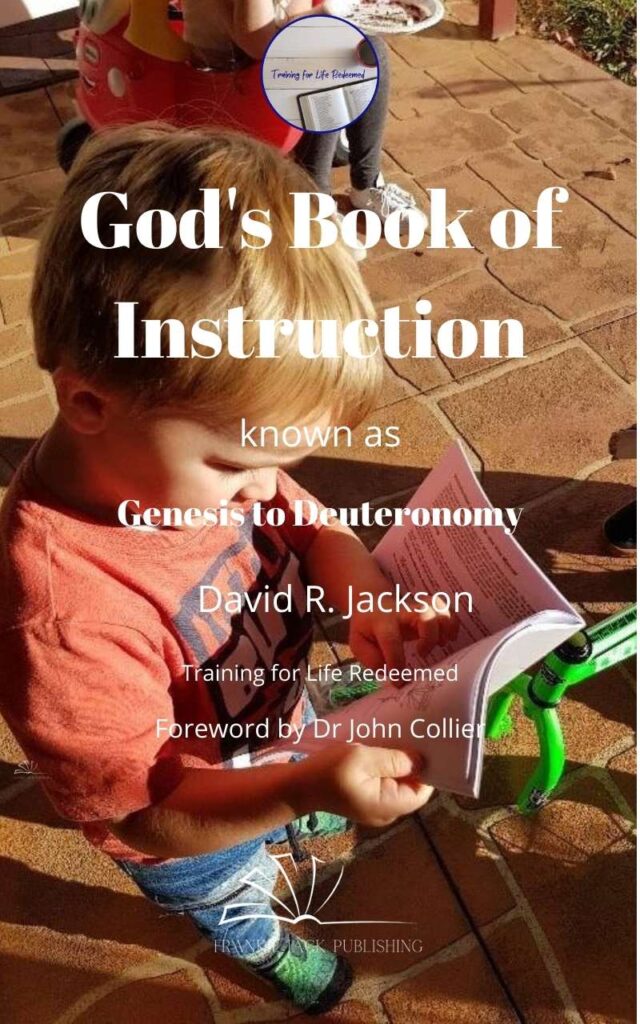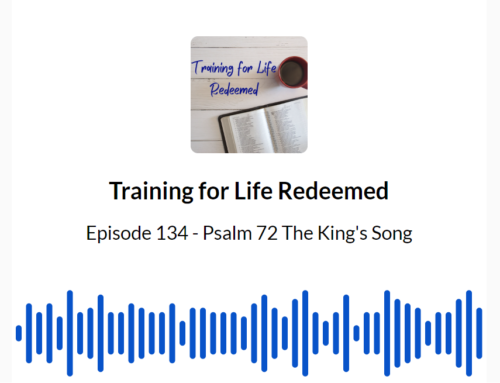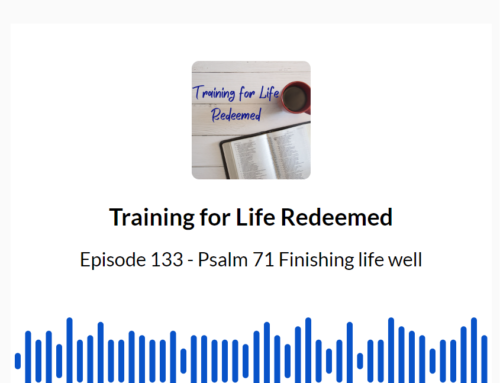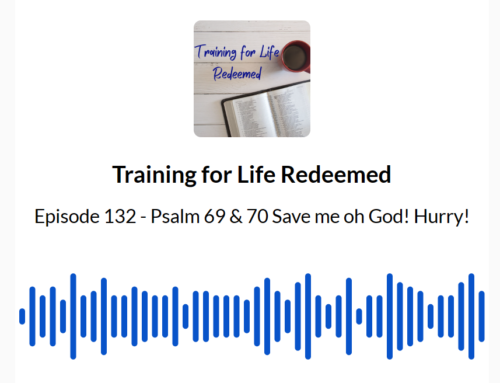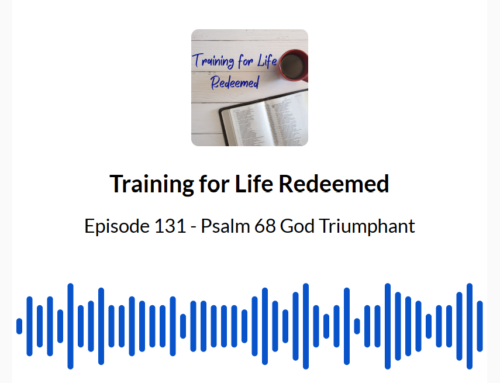Grab your notes for this episode by completing the form
and we will send you the link to all our notes.
Get the book “God’s Book of Instruction” on Amazon.
The first five books of the Old Testament constitute God’s book of instructions for his redeemed people. It reveals the character of God and his good design for life. It bears witness to the beginning of his work of redemption. It equips the believer to live in God’s world, God’s way, as God’s image for God’s glory. What sin and death have broken, God’s people can rebuild by keeping to his instructions by the power of his presence with us.
Transcript
Dan:
Well, hi everyone. And welcome to episode 12 of trainingforliferedeemed. I am Dan, your host, and I’m here with my dad, David Jackson. In our reading so far, we are up to Exodus. We’ve reached the point where Egypt had been hit with nine plagues or blows as Pharaoh dug his heels in and refused to do what God said. In this episode we will be looking at Israel’s lockdown on the night when God brought his last judgment on the families of Egypt. We are working through Exodus 11 to 13. When we read about this in children’s Bible stories, or we see it in movies, it seems very unlike God. Children, who have nothing to do with anything, are dying. Even animals and their children were dying. Why was God hitting the children?
David:
God’s hitting the children because we inherit our position as an enemy of God. These people are born into something that is utterly wicked and destructive. That judgment is going to fall on the whole earth. It’s going to affect everything over which mankind has dominion, over which we rule. And these are God’s creation. God owns this and he owns us. We are not equal with God. We’re not independent of God. He doesn’t answer to our system of justice. We have been called to manage God’s world God’s way. And we told him to take a flying leap off the planet. As a result, God is going to bring judgment down on the whole package and we need to, we need to stop whingeing about that and recognize we’re dealing with God, not just some government somewhere, and God is making the point: You have made a choice that affects your children and your grandchildren. When you tell God to go jump in the lake, that affects generations to come, and they have not had any more say in that than perhaps what country you live in. As I taught high schools, you taught high school. We’re sitting around looking at kids with, whose families have stories. And these kids have landed in o ur classroom on the other side of the planet from where their parents came from. And it was their parents and grandparents decision, not theirs. We inherit that. When the bombs dropped on Berlin and London in world war two, the kids under those bombs had no say in declaring war. It was the head of state. Britain declared war on Germany, Germany declared war on France. Everybody underneath these heads o f these representative heads, copped the c onsequence of those decisions, mums and dads individuals have to start making the decision to step out from under that war and to change sides in order to be saved. Otherwise, the whole thing goes down and God is teaching us reality and we need to stop whingeing about it, face it, and deal with i t.
Dan:
All right . So then when we come to the Passover meal, God gives lots of very detailed instructions. He thinks a bit pedantic here is he just obsessed with trivia? You know, he’s got what kind of lamb you need when to bring it home, the exact time to kill it, how to prepare the food and what to wear all the way down to, you know, sandals and belts. And what’s in your belt. What’s going on?
David:
Ah , look, if you ever run a lockdown drill at a school or a business, you discover very quickly that (a) you need to have a very pedantic plan and you need to have thought of every contingency and you need to have trained your people to follow it. I still remember , one of the rules for lockdown drills was, as you a re l eaving or fire drills, when you leave the building, don’t talk, listen for the announcements because you don’t know what’s going on. And if you’re not listening, people are going to get hurt. Try e nforcing that on 650 high school students, as they let out of a fire drill to go a nd a ssemble. If we don’t know exactly where we’re going and what to bring, if you don’t have a packing list. But beside that this meal is designed to teach us what Jesus will do to save us. This sheep or goat is gonna die instead of your first born son. So there’s a reason why that thing that animal has to be spotlessly healthy. We can’t have damaged goods paying for damaged goods. Jesus is going to come. He’s going to be sinless. He’s going to die. Not one bone will be broken. All of this symbolism is built into this exercise. And if people and the urgency is built in, can I have your sandals on your feet? Have your walking stick in your hand, have the, the cart , packed the chickens on the wagon. Grandma’s chair. Ready to put her up on top, where you’ve gotta be ready to go. There’s urgency to salvation. This is all built into this story. It’s an object lesson to train and to teach us the nature and the reality, the fear, the excitement of what God is doing as he saves us out of a world that’s under judgement.
Dan:
Yeah. So this Passover is going to be celebrated for a long time throughout Israel’s history. After this event, Jesus himself is going to celebrate the Passover meal with his disciples and essentially turn it into what we now call the Lord’s supper. But the Lord’s supper doesn’t seem to have the same kind of rules or anything on it. Churches just kind of put it normally towards the end of a service, hand out the wine, have a piece of bread or some kind of rice paper, cookie. Why , why is the Passover so complicated? But yet the Lord’s supper is just, you know, drink a bit of juice or wine, or they’ve had a tiny bit of bread. It’s all over in five minutes. Yeah, yeah. Yeah. Well,
David:
It wasn’t supposed to be like that. A covenant sign is given to remind people of what God did in the past to save us. And then to remind us of the promises of how that salvation is going to work out in the future. Passover told the people of Israel to remember what God did that night to get them out of Egypt. It also reminded them of the promise that he would bring them into their promised land and keep all those promises he gave to Abraham and back to the woman in the garden. So we’re looking back and we’re looking forward. And the , the things that make up a covenant sign are supposed to be things that connect with the event and with the promise. So if you think back to a covenant sign like circumcision, I promised you that you would have as many sons as the stars in the sky. Well circumcise each one of them. And after the RSI sets in, you start to remember that God is keeping his promise. Here is another one. Here is another one in that promise. I’m going to send you the saviour, the promise boy, the boy will be born of the woman. One of these kids you’re circumcising is going to be the saviour, check out each one. And eventually there he is. Covenant signs are reminders. And the , the elements of the covenant sign carries, meaning that connects with the promise. I think when we look at the Lord’s supper, we’re not looking back at how it transforms the Passover. So we go from a lamb to Jesus on a cross, an unblemished lamb to a sinless man dying in my place. We look at the concept of a body that is given. We look at the fact that the life of that body was poured out. So the blood, the element of blood painted on the door in Passover, the wine that we’re supposed to be drinking at the Lord’s supper is supposed to remind us of blood. And if you drain the life out of somebody or out of an animal, that’s, the life is gone. They’re dead. It’s , it’s a statement that Jesus actually died. To remember those things and then to remember and proclaim his death until he returns. We’re proclaiming that Passover was a little sample of judgment. What Jesus did on the cross was our judgment. And in the future, there’s a judgment coming and Jesus is the judge. And so at the Lord’s supper, we’re reflecting on our relationship with him and with his people. And there should be this awe, and wonder like, I think, I mean , you’re my second son. Imagine being the , you , you’ve got a son, your firstborn son. And on this night, he would be dead if it wasn’t for that lamb and that blood on the door. How does the first born son feel, when the sons in the houses, down the street, a dead and he’s alive. There’s that victim guilt, the survivor’s guilt that God was gracious to me. And it’s because I came in under that blood and other people chose not to. So there’s lessons to be learned here. So as you come to the Lord’s supper, I look around and I, I’m always excited to see who else is there. Discerning the body means looking at the people, not the bread. You know, you , you , you’re looking at the body of Christ. The body of Christ is the people who are sitting with you at the Lord’s table saying, I belong to Jesus. I got saved. And then when you see them and you, look, you say, well, what am I doing here? What an awesome exercise of grace that I’m in the house. And I’m safe because Jesus was that lamb who died for me. This is all supposed to mean something to us. It’s not just a little tack on ritual.
Dan:
Yeah. And now there’s this other thing in Exodus here where you were talking about my son, right? I’ve a firstborn son now eight. So there’s a thing here where the future firstborn sons also have to be redeemed. And so there’s a sacrifice or some kind of purchase payment type thing. That’s happening here to redeem the firstborns after the Passover. What’s that about?
David:
Well, it’s a pretty good rule. I mean, I, my dad, wasn’t a believer. So I come from a household where that didn’t follow the gospel. My wife, your mother was raised in a family that had been believers for generations. And they tell the story that the first generation to be converted are really passionate about their salvation. And they value it. They know what they came out of. They know what they’ve come into. They saw the cost , and it’s , it’s, you know, he was forgiven little, loves, little, they know what it means. Second generation grows up taking it for granted. Third generation: T hey don’t even know what happened and they don’t care. They just enjoy all the toys that come with it. So the first generation believes get their l ife sorted out. By the time the second generation comes along, God has blessed them richly. And the third generation is only interested in the rich blessings, not in how they got them. And so we forget , we forget t oo quickly how we got here. So what God is doing here in Exodus 13, is he’s saying, you’re not going to forget this. I want you to stop and realize how many of your ancestors were firstborn sons? How many of you are related back to a firstborn son on that day in Egypt? If that firstborn son had died, you and all of your ancestors would not exist. You need to remember that the only reason you’re here is because we saved that f irstborn son, and you need to appreciate it for yourself. So when you have a firstborn son redeem him. You c an’t cut his throat and offer him as a sacrifice to the Lord. That’s wrong. So you’ve got to buy him back. You’ve got to buy him back from the Lord. If you don’t buy him back from the Lord, you got to dedicate him to the Lord. And if you dedicate an animal, you kill it. You offer it as a sacrifice. If you dedicate a kid, you hand your child over to the priest . Like Samuel was handed over to Eli to become a priest of God. Do you want to give your kid up for adoption or do you want to buy him back? But you’ve got to remember that if God hadn’t redeemed that firstborn son, you and yours, wouldn’t be here and you’ve got to value it for yourself.
Dan:
Hey , almost it looks really well back with Abraham and Isaac, too. Isaac’s the firstborn son of the promise. And he’s the one that’s meant to be sacrificed. And yet there’s a ram to replace him. And it’s essentially buying back Isaak from God in that kind of context . Yeah .
David:
Well, this is a pattern that’s going to keep repeating so that we get the message and we understand what Jesus is going to do, and at what cost to save us and never forget the value of that and never fail to appreciate what it took for us to be saved.
Dan:
It is easy to cruise along and take our salvation lightly, but the 10th plague, the Passover feast and the Lord’s supper bring out how much more involved this really is. It would have been a terrifying experience to hide in those homes and those houses and wait, and then have to escape Egypt with such urgency. Reading this part of the Bible gives us a much greater appreciation of the links God has gone to in saving us with Jesus on that cross. Well , if you want the study notes for this episode, please head over to trainingforliferedeemed.com / 12. And of course, remember to hit the subscribe button so that you don’t miss out on our next episode, when we hope you’ll join us. When we will be looking at Israel’s escape from Pharaoh and their commitment to way to be his Holy people.
